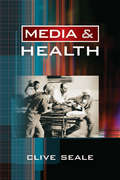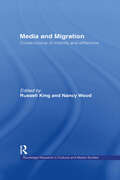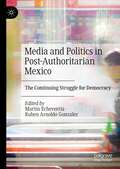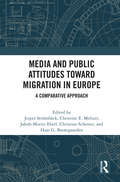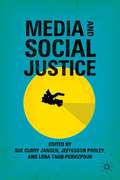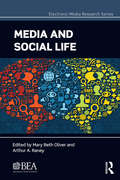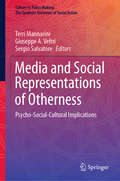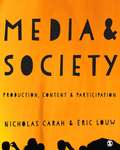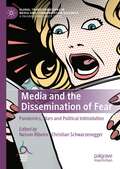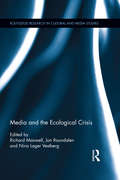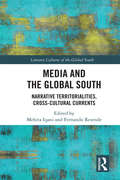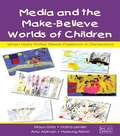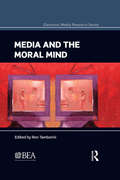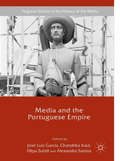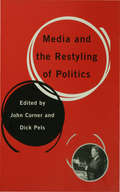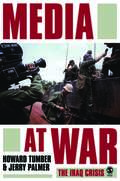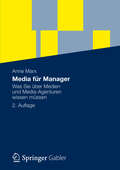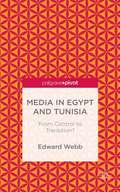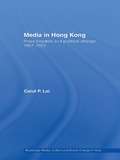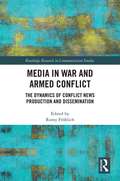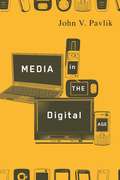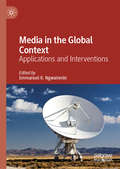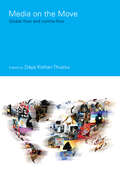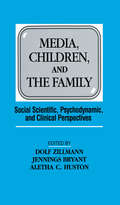- Table View
- List View
Media and Health (Sociology Of Health And Illness Monographs)
by Clive Seale`This book appears to fill a substantial gap in the literature at present. There are, quite simply, no books available which engage seriously and competently with the presentation of health issues in the media, and certainly none which focuses on representations of health and illness in as thematically coherent a manner as Seale proposes to do' - Richard Gwyn, University of Cardiff `This is an excellent resource for students. It provides a comprehensive review of secondary literature in the field and is very well researched. Students of sociology of health and illness and in media and communication studies will find the book invaluable' - David Oswell, Goldsmiths College, University of London `This is a comprehensive work on media health, providing an invaluable "toolkit" for understanding health and the media in contemporary society. Seale goes further than previous textbooks, critiquing the "lament" of media health promoters in order to explore the moralisation and commercialisation of media health' - Dr Annette Hill, University of Westminster How are health matters presented by the mass media? How accurate are the messages we are receiving? This book demonstrates how health messages in popular mass media are important influences in our lives, and that they are not neutral, being subject to many determining influences. It demonstrates the importance of mass media for understanding the experience of illness, health and health care, bringing together the latest thinking in the field of media studies and the sociology of health and illness. This book provides a thorough review of research literature on media representations of health, illness and health care, covering their production, characteristic forms and relationships with the everyday lives of media audiences. It brings together both well known and lesser-known studies in the context of an integrated, sociological argument about media and health. Media producers are subject to a variety of influences, from medical lobbies, scientific organizations, and not least the commercial pressure to satisfy media-saturated audiences. These mean that aims of health promoters are not always easily achieved, leading to considerable tensions that require a deeper understanding of media health than has hitherto been applied to them. This book will be essential reading for health educators and promoters, as well as health care providers interested in the cultural aspects of health, sociologists of health and illness, and students and academics of media studies.
Media and Migration: Constructions of Mobility and Difference (Routledge Research in Cultural and Media Studies #Vol. 8)
by Nancy Wood Russell KingThis title explores the close and vital relationship between the contemporary media and immigration. Drawing on newspapers, magazines, film, television and photography, the contributors examine the effects of mass media on migration behaviour and ethnic identity. Using examples from a range of countries, Media and Migration illustrates how the media intervenes to affect the reception migrants receive, how it stimulates prospective migrants to move and how it plays a dynamic role in the cultural politics and cultural identity of diasporic communities.
Media and Politics in Post-Authoritarian Mexico: The Continuing Struggle for Democracy
by Martin Echeverria Ruben Arnoldo GonzalezThis volume presents an analytical and empirical overview of the array of issues that the Mexican media faces in the post-authoritarian age, which jointly explains how a partially accomplished democracy, its authoritarian inertias, and its unintended consequences hinder the democratic performance of the media. This is analyzed from three points of view: the stalemate Mexican media system and ineffective regulations, the conditions of risk and insecurity of the journalists on the field, and the limits of freedom of expression, political substance, and inclusiveness of media content. A binational effort, with research from US and Mexican authors, a wide analytic perspective is provided on the macro, meso, and micro levels, allowing for a deep conceptual richness and a comprehensive understanding of the Mexican case. With leading researchers in the field, the volume revolves around the problems of the media in post-authoritarian democracies. By answering the questions of how and why the Mexican media has not fully democratized, the works encompassed here can resonate with and are relevant to other post-authoritarian countries and academic disciplines.
Media and Public Attitudes Toward Migration in Europe: A Comparative Approach
by Jesper Strömbäck, Christine E. Meltzer, Jakob- Moritz Eberl, Christian Schemer, and Hajo G. BoomgaardenThis comparative volume provides a comprehensive cross-national account of media coverage and public attitudes toward migration both within and into the European Union. Using empirical research from across Germany, Hunary, Poland, Spain, Sweden, and the United Kingdom, Media and Public Attitudes Toward Migration in Europe offers an in-depth exploration of one of the most prominent social and political topics of the decade in Europe. Drawing on a large scale, cross-national panel survey, experiments, and media content analysis of migration discourse in both traditional news media and social media, expert contributors from across the continent investigate topics such as the linguistic features of migration coverage, the public perception of migrants, and the effects of journalistic communication strategies. Other topics addressed include a discussion of news framing effects on migration coverage and politicians’ postings on social media coverage about the issue. This is a valuable resource for academics, students, and policymakers interested in media coverage of migration, news framing effects, and public attitudes to migration generally..
Media and Social Justice
by Sue Curry JansenThis book is an anthology of work by critical media scholars, media makers, and activists who are committed to advancing social justice. Topics addressed include but are not limited to international media activist projects such as the Right to Communication movement and its corollaries; the importance of listening and enacting policies that advance democratic media; regional and local media justice projects; explorations of the challenges the era of participatory media pose to public media; youth and minority media projects and activism; ethical dilemmas posed by attempts to democratize access to media tools; the continued marginalization of feminist perspectives in international policy venues; software freedom and intellectual property rights; video activism in both historical and contemporary contexts; internet strategies for defending dissenting voices; and five accounts by prominent scholar/activists of their lifelong struggles for media justice.
Media and Social Life (Electronic Media Research Series)
by Mary Beth Oliver Arthur A. RaneyOur use of media touches on almost all aspects of our social lives, be they friendships, parent-child relationships, emotional lives, or social stereotypes. How we understand ourselves and others is now largely dependent on how we perceive ourselves and others in media, how we interact with one another through mediated channels, and how we share, construct, and understand social issues via our mediated lives. This volume highlights cutting edge scholarship from preeminent scholars in media psychology that examines how media intersect with our social lives in three broad areas: media and the self; media and relationships; and social life in emerging media. The scholars in this volume not only provide insightful and up-to-date examinations of theorizing and research that informs our current understanding of the role of media in our social lives, but they also detail provocative and valuable roadmaps that will form that basis of future scholarship in this crucially important and rapidly evolving media landscape.
Media and Social Representations of Otherness: Psycho-Social-Cultural Implications (Culture in Policy Making: The Symbolic Universes of Social Action)
by Giuseppe A. Veltri Sergio Salvatore Terri MannariniThis book presents the main findings of an empirical exploration of media discourses on social representations of “otherness” in seven European countries. It focuses on the analysis of press discourses produced over a fifteen-year period (2000–2015) on three contemporary figures of otherness that challenge the identity of European societies, question the attitudes towards diversity, and pose significant challenges for policy-makers: immigration, Islam, and LGBT. The book provides a comprehensive and articulate map of how national media addresses such themes from both synchronic and diachronic perspectives, revealing patterns of continuity and discontinuity across time and space. Lastly, it discusses these patterns in the light of their cultural meanings and their influence on social and political collective behaviours.
Media and Society: Production, Content and Participation
by Nicholas Carah Eric Louw'This is the media and society text that critical scholars have been waiting for'. - Professor Mark Andrejevic, Pomona College This book unpacks the role of the media in social, cultural and political contexts and encourages you to reflect on the power relationships that are formed as a result. Structured around the three cornerstones of media studies; production, content and participation, this is an ideal introduction to your studies in media, culture and society. The book: Evaluates recent developments in media production, industries and platforms brought about the emergence of interactive media technologies. Examines the shifting relationship between media production and consumption instigated by the rise of social and mobile media, recasting consumption as ‘participation’. Explores the construction of texts and meanings via media representations, consumer culture and popular culture, as well as the relationship between politics and public relations. Assesses the debates around the creative and cultural labour involved in meaning-making. Includes a companion website featuring exercise and discussion questions, links to relevant blogs and web material, lists of further reading and free access to key journal articles.
Media and Society: Production, Content and Participation
by Nicholas Carah Eric LouwThis book unpacks the role of the media in social, cultural and political contexts and encourages you to reflect on the power relationships that are formed as a result. Structured around the three cornerstones of media studies; production, content and participation, this is an ideal introduction to your studies in media, culture and society. The book: Evaluates recent developments in media production, industries and platforms brought about the emergence of interactive media technologies. Examines the shifting relationship between media production and consumption instigated by the rise of social and mobile media, recasting consumption as 'participation'. Explores the construction of texts and meanings via media representations, consumer culture and popular culture, as well as the relationship between politics and public relations. Assesses the debates around the creative and cultural labour involved in meaning-making. Includes a companion website featuring exercise and discussion questions, links to relevant blogs and web material, lists of further reading and free access to key journal articles.
Media and the Dissemination of Fear: Pandemics, Wars and Political Intimidation (Global Transformations in Media and Communication Research - A Palgrave and IAMCR Series)
by Christian Schwarzenegger Nelson RibeiroThis book offers a diachronical and inter-/transmedia approach to the relationship of media and fear in a variety of geographical and cultural settings. This allows for an in-depth understanding of the media’s role in pandemics, wars and other crises, as well as in political intimidation. The book assembles chapters from a variety of authors, focusing on the relation between media and fear in the West, the Middle East, the Arab World and China. Besides its geographical and cultural diversity, the volume also takes a long-term perspective, bringing together cases from transforming media environments which span over a century. The book establishes a strong and historically persistent nexus between media and fear, which finds ever-new forms with new media but always follows similar logics.
Media and the Ecological Crisis (Routledge Research in Cultural and Media Studies)
by Richard Maxwell Jon Raundalen Nina Lager VestbergMedia and the Ecological Crisis is a collaborative work of interdisciplinary writers engaged in mapping, understanding and addressing the complex contribution of media to the current ecological crisis. The book is informed by a fusion of scholarly, practitioner, and activist interests to inform, educate, and advocate for real, environmentally sound changes in design, policy, industrial, and consumer practices. Aligned with an emerging area of scholarship devoted to identifying and analysing the material physical links of media technologies, cultural production, and environment, it contributes to the project of greening media studies by raising awareness of media technology’s concrete environmental effects.
Media and the Global South: Narrative Territorialities, Cross-Cultural Currents (Literary Cultures of the Global South)
by Mehita Iqani Fernando ResendeWhat does the notion of the ‘global south’ mean to media studies today? This book interrogates the possibilities of global thinking from the south in the field of media, communication, and cultural studies. Through lenses of millennial media cultures, it refocuses the praxis of the global south in relation to the established ideas of globalization, development, and conditions of postcoloniality. Bringing together original empirical work from media scholars from across the global south, the volume highlights how contemporary thinking about the region as theoretical framework ・ an emerging area of theory in its own right ・ is incomplete without due consideration being placed on narrative forms, both analogue and digital, traditional and sub-cultural. From news to music cultures, from journalism to visual culture, from screen forms to culture-jamming, the chapters in the volume explore contemporary popular forms of communication as manifested in diverse global south contexts. A significant contribution to cultural theory and communications research, this book will be of interest to scholars and researchers of media and culture studies, literary and critical theory, digital humanities, science and technology studies, and sociology and social anthropology.
Media and the Make-Believe Worlds of Children: When Harry Potter Meets Pokemon in Disneyland (Routledge Communication Series)
by Dafna Lemish Maya Gotz Hyesung Moon Amy AidmanMedia and the Make-Believe Worlds of Children offers new insights into children's descriptions of their invented or "make-believe" worlds, and the role that the children's experience with media plays in creating these worlds. Based on the results of a cross-cultural study conducted in the United States, Germany, Israel, and South Korea, it offers an innovative look at media's role on children's creative lives.This distinctive volume:*outlines the central debates and research findings in the area of children, fantasy worlds, and the media;*provides a descriptive account of children's make-believe worlds and their wishes for actions they would like to take in these worlds;*highlights the centrality of media in children's make believe worlds;*emphasizes the multiple creative ways in which children use media as resources in their environment to express their own inner worlds; and*suggests the various ways in which the tension between traditional gender portrayals that continue to dominate media texts and children's wishes to act are presented in their fantasies.The work also demonstrates the value of research in unveiling the complicated ways in which media are woven into the fabric of children's everyday lives, examining the creative and sophisticated uses they make of their contents, and highlighting the responsibility that producers of media texts for children have in offering young viewers a wide array of role models and narratives to use in their fantasies. The downloadable resources provide full-color images of the artwork produced during the study.This book will appeal to scholars and graduate students in children and media, early childhood education, and developmental psychology. It can be used in graduate level courses in these areas.
Media and the Moral Mind (Electronic Media Research Series)
by Ron TamboriniQuestions regarding the relation between media and morality have been a lasting concern. Can media exposure shape or alter moral values? Does morality influence how audience members select, interpret and respond to media content? Attempts to answer such questions are hindered by the complex nature of morality and its dynamic relation with media. This volume brings together leading scholars in an effort to examine reciprocal processes that connect media with morality, and to set a course for understanding this association. Individual essays combine established and emerging theories from media and moral psychology to explain how fundamental mechanisms that govern moral reasoning can shape and be shaped by media exposure. Together these scholars provide an understanding of the relationship between media and morality that should serve as an invaluable resource for current and future generations of researchers.
Media and the Portuguese Empire
by José Luís Garcia Chandrika Kaul Filipa Subtil Alexandra SantosThis volume offers a new understanding of the role of the media in the Portuguese Empire, shedding light on the interactions between communications, policy, economics, society, culture, and national identities. Based on an interdisciplinary approach, this book comprises studies in journalism, communication, history, literature, sociology, and anthropology, focusing on such diverse subjects as the expansion of the printing press, the development of newspapers and radio, state propaganda in the metropolitan Portugal and the colonies, censorship, and the uses of media by opposition groups. It encourages an understanding of the articulations and tensions between the different groups that participated, willingly or not, in the establishment, maintenance and overthrow of the Portuguese Empire in Angola, Mozambique, S#65533;o Tom#65533; e Pr#65533;ncipe, Cape Verde, Guinea-Bissau, India, and East Timor.
Media and the Restyling of Politics: Consumerism, Celebrity and Cynicism
by John Corner Dr Dick PelsWithin media research and cultural studies, the mediation of politicians and the play-off between versions of high and low politics are attracting increasing interest. Media and the Restyling of Politics brings together the work of leading academics in media and cultural studies to pursue an agenda of research, analysis and debate about the changing nature of political culture and its mediation. The contributors question the ways in which emerging forms of political style relate not only to new conventions of celebrity and publicity but to ideas about representation, citizenship and the democratic process. Topics covered include: celebrity politicians, the marketing of politics, identity and popular culture.
Media at War: The Iraq Crisis
by Howard Tumber Jerry Palmer′Tumber and Palmer have provided an invaluable review of how journalists covered and reported the Iraq war and its aftermath. Their exhaustive research has resulted in an impressive analysis that makes this book essential reading′ - John Owen, Executive Producer of News Xchange and Visiting Professor of Journalism, City University ′This is a meticulously researched book that lays bare the way the war was reported. Decide for yourself whether the media ′embeds′ - of whom I was one - were the world′s eyes and ears inside the military, or merely the puppets of the Pentagon and the Ministry of Defence in London′ - Ben Brown, BBC ′Media at War offers insights into the ways in which media at war inevitably become participants in both the military and the political wars′ - Professor Michael Gurevitch, University of Maryland International media coverage of the war in Iraq provoked public scrutiny as well debate amongst journalists themselves. Media at War offers a critical overview of the coverage in the context of other preceding wars, including the first Gulf War, and opens up the debate on the key questions that emerged during the crisis. For example, - What did we actually gain from ′live, on the spot′ reporting? - Were journalists adequately trained and protected? - How compromised were the so-called ′embedded′ journalists? Tumber and Palmer′s analysis covers both the pre-war and post war phase, as well as public reaction to these events, and as such provides an invaluable framework for understanding how the media and news organisations operated during the Iraq Crisis.
Media für Manager
by Anne MarxDieser praktische Leitfaden hilft Produkt- und Marketingmanagern, gegenüber Media-Anbietern und -Agenturen kompetent und souverän aufzutreten. Sie erfahren, wie Agenturen arbeiten und wie Sie von Ihrer Agentur eine optimale Leistung einfordern, was eine erfolgreiche Media-Planung ausmacht und welche Mediengattungen und Werbeformen Sie kennen sollten. Ein kompakter und verständlicher Überblick über die Media-Basics! Die 2. Auflage wurde aktualisert und die Themen Social Media, Gaming, Mobile Marketing, Digital Retailling, Crossmedia Integration und TV grundlegend neu konzipiert.
Media in Egypt and Tunisia: From Control to Transition?
by Edward WebbThis book examines the mass media systems of Egypt and Tunisia under the pre-uprising regimes, with a focus on the last decade of the Mubarak and Ben Ali periods, as well as on how media are adapting to the political transitions underway. Findings are based on extensive interviews with journalists.
Media in Hong Kong: Press Freedom and Political Change, 1967-2005 (Media, Culture and Social Change in Asia)
by Carol P. LaiThis book examines the Hong Kong media over a forty year period, focusing in particular on how its newspapers and TV stations have struggled for press freedom under the colonial British administration, as well as Chinese rule. Making full use of newly declassified material, extensive interviews and specific case-studies, it provides an illuminating analysis of the dynamics of political power and its relationship with media censorship. Overall, this book is an impressive discussion of the evolving face of the Hong Kong media, and is an important contribution to theoretical debates on the relationship between political power, economics, identity and journalism.
Media in War and Armed Conflict: Dynamics of Conflict News Production and Dissemination (Routledge Research in Communication Studies)
by Romy FröhlichThis book focuses on the social process of conflict news production and the emergence of public discourse on war and armed conflict. Its contributions combine qualitative and quantitative approaches through interview studies and computer-assisted content analysis and apply a unique comparative and holistic approach over time, across different cycles of six conflicts in three regions of the world, and across different types of domestic, international and transnational media. In so doing, it explores the roles of public communication through traditional media, social media, strategic communication, and public relations in informing and involving national and international actors in conflict prevention, resolution and peace-keeping. It provides a key point of reference for creative, innovative, and state-of-the-art empirical research on media and armed conflict.
Media in the Digital Age
by John PavlikDigital technologies have fundamentally altered the nature and function of media in our society, reinventing age-old practices of public communication and at times circumventing traditional media and challenging its privileged role as gatekeepers of news and entertainment. Some critics believe these technologies keep the public involved in an informed discourse on matters of public importance, but it isn't clear this is happening on a large scale. Propaganda disguised as news is flourishing, and though interaction with the digital domain teaches children valuable skills, it can also expose them to grave risks. John V. Pavlik critically examines our current digital innovations-blogs, podcasting, peer-to-peer file sharing, on-demand entertainment, and the digitization of television, radio, and satellites-and their positive and negative implications. He focuses on present developments, but he also peers into the future, foreseeing a media landscape dominated by a highly fragmented, though active audience, intense media competition, and scarce advertising dollars. By embracing new technologies, however, Pavlik shows how professional journalism and media can hold on to their role as a vital information lifeline and continue to operate as the tool of a successful democracy.
Media in the Global Context: Applications and Interventions
by Emmanuel K. NgwainmbiThis book investigates ways in which global media coverage of conflicts affects the worldviews of the social and cultural values of nationals from the war regions. It identifies the cultural patterns in remote communities that have been ‘diluted’ by IT and the extent to which the changes impacted the values of the indigenes. It also describes the role that IT especially social media and broadcast media play in the understanding of war among residents in highly wired and remote communities, respectively.
Media on the Move: Global Flow and Contra-Flow (Communication and Society)
by Daya Kishan ThussuMedia on the Move provides a critical analysis of the dynamics of the international flow of images and ideas. This comes at a time when the political, economic and technological contexts within which media organisations operate are becoming increasingly global. The surge in transnational traffic in media products has primarily benefited the major corporations such as Disney, AOL, Time Warner and News Corporation. However, as this book argues, new networks have emerged which buck this trend: Brazilian TV is watched in China, Indian films have a huge following in the Arab world and Al Jazeera has become a household name in the West. Combining a theoretical perspective on contra-flow of media with grounded case studies into one up-to-date and accessible volume, Media on the Move provides a much-needed guide to the globalization of media, going beyond the standard Anglo-American view of this evolving phenomenon.
Media, Children, and the Family: Social Scientific, Psychodynamic, and Clinical Perspectives (Routledge Communication Series)
by Jennings Bryant Aletha C. Huston Dolf ZillmannThis book brings together a group of scholars to share findings and insights on the effects of media on children and family. Their contributions reflect not only widely divergent political orientations and value systems, but also three distinct domains of inquiry into human motivation and behavior -- social scientific, psychodynamic (or psychoanalytical), and clinical practice. Each of these three domains is privy to important evidence and insights that need to transcend epistemological and methodological boundaries if understanding of the subject is to improve dramatically. In keeping with this notion, the editors asked the authors to go beyond a summary of findings, and lend additional distinction to the book by applying the "binoculars" of their particular perspective and offering suggestions as to the implications of their findings. One of the goals of the conference that resulted in this book was consensus building in the area of media and family. From examining the findings and insights of a diverse group of scholars, it seems that consensus building in several areas is a distinct possibility. Addressing the concerns of educators about the influence of the mass media of communication -- entertainment programs in particular -- on children and the welfare of the nuclear family, this volume projects directions for superior programming, especially for educational television. The influence of sex and violence on children and adults is given much attention, and the development of moral judgment and sexual expectations, among other things, is explored. The critical analysis of media effects includes examination of positive contributions of the media, such as the search for missing children and exemplary educational programs.
